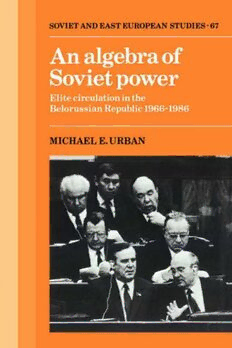
An Algebra of Soviet Power: Elite Circulation in the Belorussian Republic 1966-86 PDF
199 Pages·2008·6.359 MB·English
Most books are stored in the elastic cloud where traffic is expensive. For this reason, we have a limit on daily download.
Preview An Algebra of Soviet Power: Elite Circulation in the Belorussian Republic 1966-86
Description:
The control of office has long been regarded as the key to understanding power and policy in the Soviet system. What, however, accounts for this control of office? Numerous conventional studies have addressed this question by focusing on the individuals who make up the Soviet elite at one time or another. This book adopts a different perspective by treating the personnel system itself as a set of power relations that govern the mobility of the individuals within it. Using the Belorussian Republic as the site of the investigation, the author analyzes the movements of individuals as sequences of complex interrelations structured by the system. He demonstrates how regionalism has played an important role and patronage the decisive role in shaping the patterns of elite circulation in Belorussia, and outlines changes in these same patterns following the advent of the Gorbachev leadership, changes that were anticipated in some respects by events in Belorussia.
See more
The list of books you might like
Most books are stored in the elastic cloud where traffic is expensive. For this reason, we have a limit on daily download.
